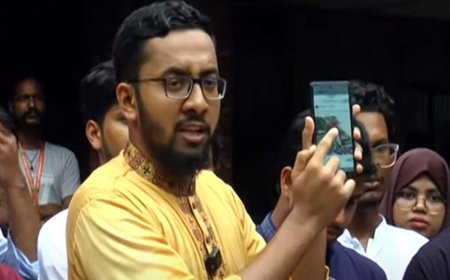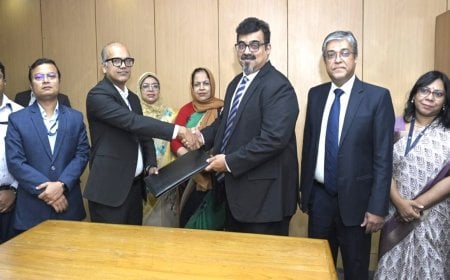AI and Disinformation: Democracy’s Digital Dilemma
A H M Bazlur Rahman

As Bangladesh prepares for its 13th National Parliamentary Election, one challenge looms large: the manipulative use of Artificial Intelligence (AI) and the unchecked spread of disinformation. While these technologies, if used responsibly, can support democratic processes, their darker sides threaten to undermine public trust, distort electoral debates, and risk fueling social instability.
Encouragingly, the Chief Election Commissioner (CEC) has already sounded the alarm regarding AI-driven risks. He has rightly warned that AI could be “more dangerous than conventional weapons” because of its ability to rapidly disseminate misleading information and fake news.
A.M.M. Nasir Uddin emphasized: “It is now possible to broadcast content using my image and voice,” highlighting the urgency of vigilance against AI misuse. He described it as a “modern threat” capable of disrupting election campaigns and influencing outcomes.
Beyond AI, the CEC identified other pressing concerns—illegal weapons, the restoration of public confidence in the voting process, and ensuring strong voter turnout. He stressed that sustained, collective dialogue is essential to strengthen electoral integrity.
Bangladesh’s Digital Landscape in 2025
With over 130 million internet users, tens of millions of social media accounts, and a rapidly expanding digital economy, Bangladesh is particularly vulnerable to AI-driven strategies and disinformation campaigns.
According to DataReportal, key statistics at the beginning of 2025 include:
-
185 million active mobile connections (106% of the total population, though not all internet-enabled).
-
77.7 million internet users (44.5% of the population).
-
60 million social media users (34.3% of the population).
These figures provide only an outline; understanding digital trends requires deeper exploration.
Social Media Trends in 2025
Social media in Bangladesh has become vibrant and transformative. Platforms like Facebook, TikTok, Instagram, and LinkedIn—together hosting over 45 million active users—are reshaping communication, connection, and commerce. Affordable smartphones, faster internet, and growing digital literacy have accelerated this shift.
Statistics (2025):
-
Total users: 60 million (34.3% of the population)
-
Gender distribution: 37% female, 63% male
-
Facebook: 60 million users
-
TikTok: 46.5 million (18+ only)
-
Instagram: 7.5 million
-
LinkedIn: 9.9 million
-
X (Twitter): 1.74 million
AI’s Electoral Implications
AI has become part of everyday reality, capable of generating hyper-realistic images, synthetic voices, and text. Yet in elections, such technology introduces new dangers.
Deepfake technology is especially troubling. It can depict political leaders as saying or doing things they never did, inflaming tensions in a deeply polarized landscape. Similarly, AI-powered bots can flood social media with fake posts, hashtags, and likes—fabricating the illusion of public opinion and misleading ordinary users.
Bangladesh’s Disinformation Ecosystem
Disinformation is not new to Bangladesh, but AI has amplified its speed and reach. What once took hours to produce and distribute can now be created in minutes and spread globally within seconds.
Communities with low digital literacy—particularly rural populations and first-time voters—face heightened vulnerability on platforms such as Facebook, YouTube, TikTok, and WhatsApp.
Elections are historically fertile ground for rumors and propaganda. In the past, candidates were targeted with fake scandals; today, AI makes such content appear more credible. A single false video—even if later debunked—can leave lasting damage in a matter of minutes.
Real-World Risks
Bangladesh has already witnessed how online rumors can spark real-life violence. During elections, these risks multiply.
An AI-generated fake audio clip suggesting electoral fraud or a leader’s incendiary speech could trigger protests, unrest, or targeted attacks. The most profound danger, however, is the erosion of trust. When citizens cannot distinguish truth from fabrication, they begin doubting legitimate news and even official election results.
Governance Gaps
There is a wide gap between technological advancement and regulatory oversight. Existing election laws focus largely on physical campaigning, leaving digital campaigning virtually unregulated.
Social media companies remain slow and underprepared to moderate Bangla content. Their lack of local context understanding worsens the situation. Without robust cooperation among government, civil society organizations (CSOs), and technology companies, harmful content cannot be effectively contained.
Steps Forward
-
Enhance digital literacy – Citizens must be equipped to verify and question online content.
-
Expand fact-checking networks – Local initiatives such as BOOM Bangladesh should be strengthened.
-
Enforce digital codes of conduct – Political parties should pledge not to exploit AI for disinformation.
-
Ensure tech platform accountability – Companies like Facebook, YouTube, and TikTok must scale up Bangla content moderation and label AI-generated content.
-
Empower CSOs – Civil society should actively monitor, report, and raise awareness.
The Road Ahead
Bangladesh’s 13th National Election is not only a test of political will—it is also a test of democracy in the digital age. The threats posed by AI and disinformation are not hypothetical but immediate and tangible, with the potential to distort democratic choices and fracture social cohesion.
If left unchecked, these technologies could erode institutional trust, incite violence, and weaken democratic structures. Yet with foresight, collaboration, and accountability, Bangladesh can confront these challenges.
As millions of Bangladeshis prepare to cast their votes, the reliability of the information they receive is as vital as the election itself. Addressing AI-driven disinformation is therefore not just a technical issue—it is central to the legitimacy of the election and the preservation of Bangladesh’s democratic future.
The author is a digital democracy development specialist, Chief Executive Officer of Bangladesh NGOs Network for Radio and Communication (BNNRC), and State Ambassador for Responsible Artificial Intelligence in Bangladesh, as well as a Policy Research Fellow.
Note: The views expressed here are solely those of the author. They do not reflect the editorial stance of Digital Bangla Media Authority. As part of its commitment to pluralism, this piece has been published without editorial intervention. Any discontent arising from it remains a matter of individual perspective.








































































































































































































